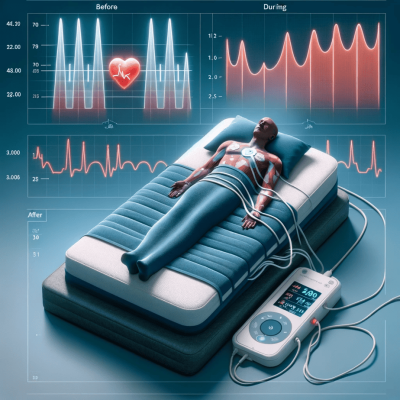If you’re having trouble sleeping, it might be time to consider undergoing some health tests. A disrupted sleep cycle can have a lot of negative consequences on your health, including increased stress levels and an increased risk for certain diseases. By getting a professional opinion on what might be causing your sleep problems, you can take the necessary steps to improve your overall health.

Table of Contents
ToggleWhat Is a Sleeping Disorder?
If you’re having trouble sleeping, it’s important to understand that there are many potential causes. One of them may be a sleep disorder. Sleep disorders are conditions that make it difficult to fall asleep or stay asleep. According to the National Institutes of Health, about 70 million Americans suffer from some form of sleeping disorder.
There are many different types of sleep disorders, including insomnia, sleep apnea, restless leg syndrome, and narcolepsy. Each disorder has its own set of symptoms and can have a major impact on your quality of life. If you’re having trouble sleeping, it’s important to talk to your doctor about the possibility that you may have a sleep disorder.
What To Do Before Seeing A Doctor?
If you think you might have a sleep disorder, there are a few tests that can be done to diagnose it. These include an overnight sleep study, a daytime sleep study, and a polysomnogram. Some of them you might even be able to do online, by visiting websites such as Check My Body Health, and others like it. Each of these tests looks at different aspects of your sleep and can help identify the cause of your sleep problems.
If you’re experiencing disrupted sleep, it’s important to visit your doctor to rule out any underlying health conditions. But before you make an appointment, there are a few things you can do to prepare.
Start by keeping a sleep diary. For one week, record when you go to bed and wake up each day, as well as how many hours you sleep. Note any other symptoms you’re experiencing, such as difficulty falling asleep, waking up frequently during the night, or feeling tired during the day.
Next, make a list of all the medications you’re taking, both prescription and over-the-counter. Be sure to include vitamins, supplements, and herbal remedies.
It’s also helpful to keep track of your sleep habits. Are you staying up late to watch television or working on the computer before bed? Are you having a drink before bed? These are all factors that can contribute to disrupted sleep.
Once you’ve gathered this information, schedule an appointment with your doctor. Be prepared to discuss your sleep habits and any other symptoms you’re experiencing. With this information, your doctor can determine if you have a sleep disorder or an underlying health condition that’s causing your sleep problems.
Next, we will go over some of the most common sleeping disorders:
Insomnia
There are many different types of sleep disorders, but one of the most common is insomnia. Insomnia is a sleep disorder that makes it difficult to fall asleep or stay asleep. According to the National Institutes of Health, about 70 million Americans suffer from some form of sleeping disorder.
There are many different causes of insomnia. It can be caused by stress, anxiety, depression, or other medical conditions. Insomnia could be happening to you because of some medication. If you have trouble sleeping, it is important to talk to your doctor about it as there are many different treatment options available.
If you are having trouble sleeping, there are a few things you can do to try and improve your sleep. One is to create a bedtime routine and stick to it as much as possible. This means going to bed at a set time every night and waking up at a set time each morning.
Creating a relaxing environment in your bedroom can also help, making sure your bedroom is dark, quiet, and cool is a great way to do that. Avoiding caffeine and alcohol before bed can also help improve your sleep. If you are still having trouble sleeping, there are many different medications that can help.
Sleep Apnea
Sleep apnea is a sleep disorder that causes pauses in breathing or shallow breaths while you sleep. These pauses can last for a few seconds to minutes and can happen hundreds of times throughout the night. Sleep apnea often goes undiagnosed because it usually happens during sleep.
There are three different types of sleep apnea: obstructive, central, and mixed. Obstructive sleep apnea is the most common and happens when your throat muscles relax and block your airway. Central sleep apnea happens when your brain doesn?t send the correct signals to your muscles to control your breathing. Mixed sleep apnea is a combination of both.
Sleep apnea can cause many different health problems, such as high blood pressure, heart attack, stroke, and even death. It is important to see a doctor if you think you might have sleep apnea. There are many different treatment options available, such as lifestyle changes, mouthpieces, surgery, and breathing devices.

Restless Leg Syndrome
Restless leg syndrome (RLS) is a sleep disorder that causes an overwhelming urge to move your legs, this urge is often accompanied by a tingling or burning sensation. RLS can make it difficult to fall asleep and stay that way.
There are two types of RLS: primary and secondary, primary RLS is the most common and has no underlying cause. Secondary RLS is less common and can be caused by other medical conditions, such as iron deficiency, kidney failure, or diabetes.
There are many different treatment options available for RLS. Some of these include lifestyle changes, medications, and surgery. Lifestyle changes such as exercising regularly, avoiding caffeine and alcohol, and sleeping on your side can help reduce the symptoms of RLS. There are also many different medications that can be used to treat RLS, such as dopaminergic drugs, anticonvulsants, and opioids. Surgery is a last resort option and is only used in severe cases where other treatments have failed.
Circadian Rhythm Disorders
Circadian rhythm disorders are sleep disorders that cause a person to have trouble sleeping at night and feeling awake during the day. These disorders can be caused by many different things, such as shift work, jet lag, and irregular sleep schedules.
There are many different treatment options available for circadian rhythm disorders. Some of these include lifestyle changes, medications, and light therapy.
Lifestyle changes such as maintaining a regular sleep schedule, avoiding caffeine and alcohol, and getting enough exercise can help reduce the symptoms of these disorders.
There are also many different medications that can be used to treat circadian rhythm disorders, such as melatonin supplements and wake-promoting drugs.
There are many different sleep disorders that can cause a variety of problems. It is important to see a doctor if you think you might have a sleep disorder. There are many different treatment options available, ranging from lifestyle changes to medications.
Sleep disorders should not be ignored as they can lead to serious health problems, if you think you might have a sleep disorder, talk to your doctor and get treatment as soon as possible.








